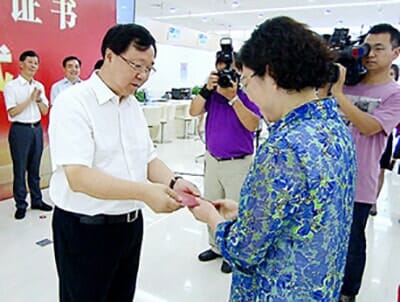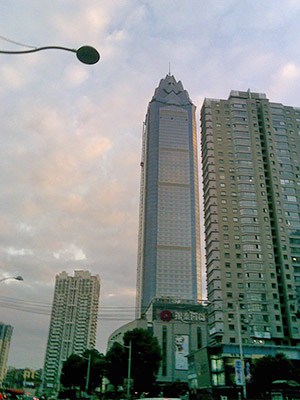
Luckily, Vice Minister Wang didn’t have to hand out those 1.2 billion gives individually
Not many Chinese homes have chimneys for Santa to scoot down, but that didn’t stop 90 percent of the country’s households from receiving a most welcome present just in time for Christmas.
All but 10 percent of Chinese families own their own home and these lucky 1.2 billion people received their gift when the Ministry of Land and Resources allowed property ownership rights in the city of Wenzhou to be extended automatically.
While bestowed by a party cadre on Friday afternoon rather than coming from a jolly old elf in a red suit on Christmas morning, the statement at a press conference by Vice Minister Wang Guanghua has the potential to save billions of dollars for Chinese citizens who essentially lease their homes long term from the government.
Wenzhou a Pioneering Case

Homes around the Wenzhou World Trade Centre may have just received a boost in value
Residents of Wenzhou, an entrepreneurial city in eastern China’s Zhejiang province, in April were the first of China’s homeowners to begin exploring the murkier waters of China’s land ownership rules when 20-year ownership rights purchased by many Wenzhou residents in the 1990s were coming to the end of their term. At the time, some residents of the city were informed that renewal of the two decade term would require government fees of up to 33 percent of the property’s value.
While stressing that the Wenzhou decision was a transitional approach and that the Ministry would continue to study the issue of land ownership rights renewal, Wang’s statement waived the proposed fee from April that would have charged residents to renew the rights to land under existing apartment buildings.
“The government has begun to study the law, and will introduce and implement it in the most efficient and effective way,” Wang said.
The law on land-use rights requires automatic renewal of those privileges. But the conditions on renewal, including potential fees have always been murky. All land in China officially belongs to the state, with land-use rights allowing homeowners up to 70-years use of the land in the case of residential properties.
The Wenzhou cases, which were from the early years of liberalisation of China’s land law had unusually short terms, and so were seen as a key test of what costs might be incurred by the rest of the nation when their 70-year land use rights came to term. The potential for substantial fees associated with land use right renewal damped interest in older properties and was seen as a disincentive to renovate or otherwise invest in aging buildings.
Leave a Reply